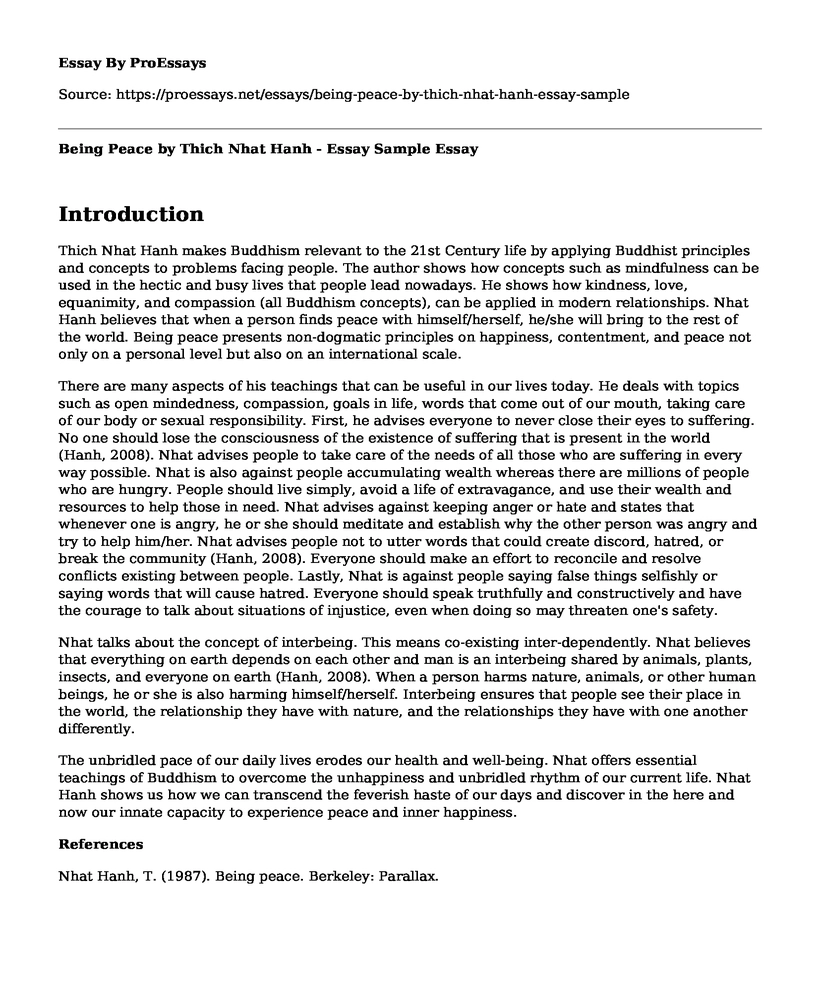Introduction
Thich Nhat Hanh makes Buddhism relevant to the 21st Century life by applying Buddhist principles and concepts to problems facing people. The author shows how concepts such as mindfulness can be used in the hectic and busy lives that people lead nowadays. He shows how kindness, love, equanimity, and compassion (all Buddhism concepts), can be applied in modern relationships. Nhat Hanh believes that when a person finds peace with himself/herself, he/she will bring to the rest of the world. Being peace presents non-dogmatic principles on happiness, contentment, and peace not only on a personal level but also on an international scale.
There are many aspects of his teachings that can be useful in our lives today. He deals with topics such as open mindedness, compassion, goals in life, words that come out of our mouth, taking care of our body or sexual responsibility. First, he advises everyone to never close their eyes to suffering. No one should lose the consciousness of the existence of suffering that is present in the world (Hanh, 2008). Nhat advises people to take care of the needs of all those who are suffering in every way possible. Nhat is also against people accumulating wealth whereas there are millions of people who are hungry. People should live simply, avoid a life of extravagance, and use their wealth and resources to help those in need. Nhat advises against keeping anger or hate and states that whenever one is angry, he or she should meditate and establish why the other person was angry and try to help him/her. Nhat advises people not to utter words that could create discord, hatred, or break the community (Hanh, 2008). Everyone should make an effort to reconcile and resolve conflicts existing between people. Lastly, Nhat is against people saying false things selfishly or saying words that will cause hatred. Everyone should speak truthfully and constructively and have the courage to talk about situations of injustice, even when doing so may threaten one's safety.
Nhat talks about the concept of interbeing. This means co-existing inter-dependently. Nhat believes that everything on earth depends on each other and man is an interbeing shared by animals, plants, insects, and everyone on earth (Hanh, 2008). When a person harms nature, animals, or other human beings, he or she is also harming himself/herself. Interbeing ensures that people see their place in the world, the relationship they have with nature, and the relationships they have with one another differently.
The unbridled pace of our daily lives erodes our health and well-being. Nhat offers essential teachings of Buddhism to overcome the unhappiness and unbridled rhythm of our current life. Nhat Hanh shows us how we can transcend the feverish haste of our days and discover in the here and now our innate capacity to experience peace and inner happiness.
References
Nhat Hanh, T. (1987). Being peace. Berkeley: Parallax.
Cite this page
Being Peace by Thich Nhat Hanh - Essay Sample . (2022, Nov 08). Retrieved from https://proessays.net/essays/being-peace-by-thich-nhat-hanh-essay-sample
If you are the original author of this essay and no longer wish to have it published on the ProEssays website, please click below to request its removal:
- The School and Community Relations
- Race and Gender in Video Games Paper Example
- African Americans: Striving for Prosperity in a Diverse Society - Essay Sample
- Essay Sample on Media, Islam and ICT: Impact of Global Village on Believers
- Christian Counseling Ethics: God's Standpoint vs. ACA's Pragmatism - Essay Sample
- Essay Example on Unequal Opportunities & Denied Dignity: Minority Groups in the US
- Essay Example on State Tested Nursing Assistant: Caring for the Community







